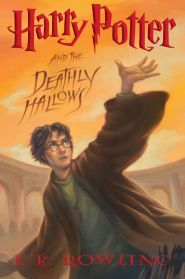Before I start, yes, there will be spoilers here. Don’t read on unless you’ve either finished, aren’t planning to read the book, or are a reasonable human being who understands that plot is only one element to a novel, and not the most important one either.
***
So the Harry Potter series is over, and I was pretty much right. (Read my entry What Will Happen in the Final Harry Potter?)
 I predicted that Harry, Ron, and Hermione would all live to the end of the series, though J.K. would keep us in suspense until the last minute. Bing! I predicted that Snape would reveal that he had killed Dumbledore and turned Death Eater on Dumbledore’s orders. Bing! I predicted that Harry would triumph over Voldemort at the expense of lots of secondary characters. Bing! I predicted that Harry would find some way to contact Sirius Black again from beyond the grave. Well, no bing! there, but I’d suggest that I deserve a partial bing! since Harry does manage to contact another dead mentor (Dumbledore) from beyond the grave.
I predicted that Harry, Ron, and Hermione would all live to the end of the series, though J.K. would keep us in suspense until the last minute. Bing! I predicted that Snape would reveal that he had killed Dumbledore and turned Death Eater on Dumbledore’s orders. Bing! I predicted that Harry would triumph over Voldemort at the expense of lots of secondary characters. Bing! I predicted that Harry would find some way to contact Sirius Black again from beyond the grave. Well, no bing! there, but I’d suggest that I deserve a partial bing! since Harry does manage to contact another dead mentor (Dumbledore) from beyond the grave.
Of course, you can chalk this up less to my amazing powers of prognostication than to the fact that J.K. Rowling made a lot of this fairly obvious. I think many of us knew that Dumbledore was going to die from the second or third book in. I mean, didn’t Obi-Wan Kenobi die on Luke Skywalker? Didn’t Gandalf die on Frodo? That’s simply the way these stories go: Our Hero receives instruction from a Wise Mentor, who later dies and leaves the hero to confront the Big Bad Villain alone.
I’ve heard a lot of people complain that the Harry Potter novels are “too derivative.” To which I say, Yes! J.K. Rowling is derivative! And that’s the entire point. One of the things that makes these books so terrific is the fact that the author is very consciously following traditional patterns. She’s taken something old and familiar, dusted it off, and made it seem fresh and new again. It’s harder to do than you think.
So how does Deathly Hallows rank? How good was the book? I’d say Deathly Hallows is the third best in the series, behind Order of the Phoenix and Prisoner of Azkaban.
I admit I was very worried about this book. L. Frank Baum got lazy a few books in to his Oz series and wrote a real stinker called The Road to Oz, which basically consists of Dorothy meeting up with all her pals and going to the Emerald City for a big party. (Baum even pulls in characters from his other books in a crass effort to draw attention to them and boost lagging sales.) Then in the sixth book, The Emerald City of Oz, Baum tried to wrap the whole thing up by making Oz invisible. C.S. Lewis had similar issues drawing Narnia to a close in The Last Battle. I dreaded the prospect of Deathly Hallows becoming a Road to Oz-type wrap-up with endless cameos by secondary characters.
So imagine my surprise that Rowling didn’t fall into this trap at all. There’s very little of that last-time-around nostalgia kick going on in Deathly Hallows. No last ride on the Hogwarts Express, no last trip to Hagrid’s shack, no last game of Quidditch. Hell, they don’t even make it to Hogwarts until the last hundred pages or so. About three-quarters of the book is focused exclusively on Harry, Ron, and Hermione, and there are quite a number of new characters here to sink your teeth into. Characters like Dobby, Neville, and Hagrid (the last of whom seemed in danger of staging a Fonzie-like takeover of the series two or three books in) only show up for short bits here and there.
That’s not to say that the book is perfect. Rowling does still indulge a number of her less-than-admirable habits in this book too. She makes too much of the plot revolve around obscure details and marginalia from several books back that we can’t be expected to keep track of. Remember how frustrating it was when Sherlock Holmes would bend to the ground at the scene of a crime, take notice of something that our narrator Watson couldn’t see, and then produce this insignificant thing at the conclusion as the final damning piece of evidence against the villain? Rowling’s got that affliction too.